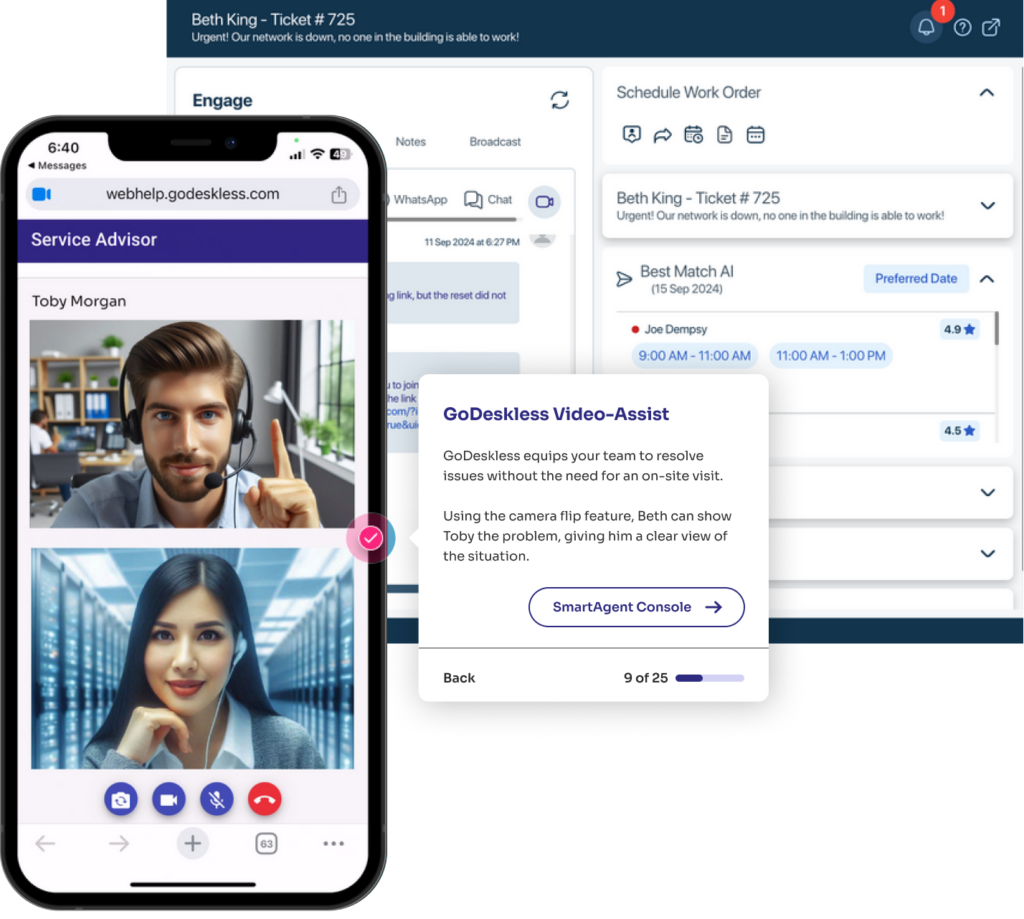The field service industry is evolving rapidly, and businesses need the right technology to stay competitive. A well-integrated field service tech stack streamlines operations, enhances customer satisfaction, and drives efficiency. Just ask Noch Power, who achieved a 50% faster time to resolution and a 27% increase in first-time fix rate.
This blog draws from our in-depth guide to help you understand the key components of a robust FSM tech stack and how to align them with your business needs.
Why Your Field Service Tech Stack Matters
In today’s fast-paced service landscape, managing scheduling, dispatch, and customer interactions manually is no longer viable. The right FSM platform provides a strategic foundation for optimizing workflows, automating processes, and delivering superior service experiences. By carefully selecting and integrating the right tools, businesses can:
- Improve first-time fix rates
- Enhance workforce productivity
- Reduce operational inefficiencies
- Strengthen customer relationships
Key Components of a Strong Field Service Tech Stack
1. Field Service Management (FSM) Platform
The backbone of any field tech services operation is a reliable FSM platform. It centralizes scheduling, dispatching, and work order management, ensuring seamless coordination between technicians and back-office teams.
When You Need It: Early on, to establish a scalable operational structure.
Key Benefits:
- Automates scheduling and dispatch
- Reduces manual errors
- Enhances real-time workforce visibility
2. Customer Relationship Management (CRM) Tool
A CRM system helps businesses manage customer interactions, track service history, and improve customer satisfaction. A well-integrated CRM ensures that all customer data is easily accessible and actionable.
When You Need It: Managing customer relationships becomes complex and requires a centralized system.
Key Benefits:
- Stores and organizes customer data
- Enhances customer engagement
- Improves service personalization
Discover how to optimize your customer service management in our guide: Customer Service Management.
3. Asset and Inventory Management
For field tech services, having the right parts and equipment available is crucial. An asset and inventory management system prevents delays caused by missing tools or untracked resources.
When You Need It: When manual inventory tracking becomes inefficient and leads to service disruptions.
Key Benefits:
- Provides real-time visibility into inventory
- Minimizes downtime and delays
- Improves resource allocation
4. Billing and Payment Systems
Automated billing and payment solutions help streamline financial transactions, reducing errors and enhancing cash flow management.
When You Need It: When manual invoicing becomes time-consuming and inefficient.
Key Benefits:
- Speeds up payment processing
- Reduces administrative overhead
- Enhances financial accuracy
5. Phone Systems
While digital communication is on the rise, some customers still prefer phone-based support. An automated phone system allows for easy work order creation and customer inquiries.
When You Need It: If your customer base favors phone support over self-service options.
Key Benefits:
- Enhances customer communication
- Automates ticket creation via phone
- Improves service accessibility
6. Enterprise Resource Planning (ERP) Systems
As businesses scale, an ERP system becomes essential for managing company-wide resources like finance, HR, and supply chain operations.
When You Need It: When centralized resource management is necessary for operational efficiency.
Key Benefits:
- Unifies business processes
- Enhances data flow across departments
- Supports long-term scalability
Building the Perfect FSM Tech Stack
The ideal field service tech stack starts with a strong FSM platform and evolves as your business grows. By integrating CRM, inventory management, billing, and ERP systems, businesses can create an agile and efficient service operation.
Each component of the FSM tech stack should enhance operational efficiency, customer engagement, and overall business performance. Thoughtful implementation ensures your business stays competitive and ready to meet future challenges.
Learn more about workforce management and how it fits into your FSM strategy: Workforce Management 101.
Elevate Your Field Service Operations with GoDeskless
At GoDeskless, we specialize in helping businesses optimize their field tech services through a seamlessly integrated FSM platform. Our solution streamlines scheduling, enhances communication, and connects all essential tools in your tech stack.
Ready to build a future-proof field service tech stack? Discover how GoDeskless can transform your operations—Try our interactive demo today!





